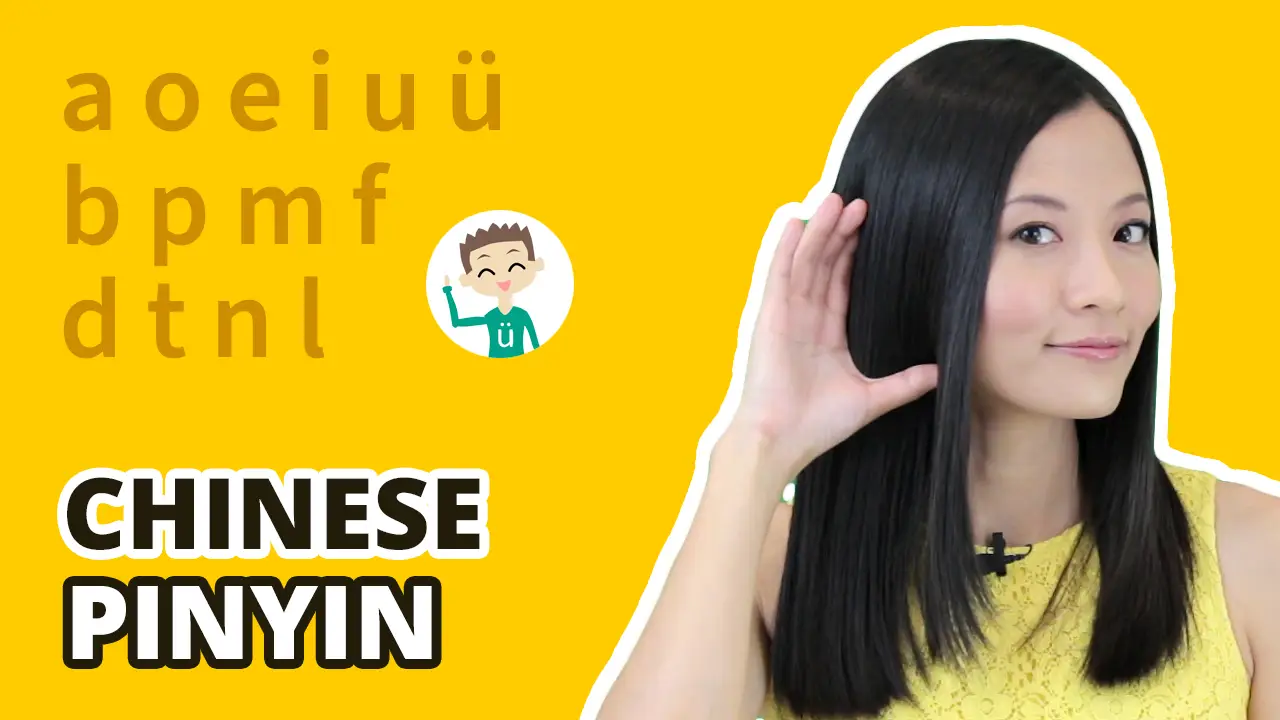Pinyin Lesson 11 – Compound Finals and Nasal Finals Group 5&6
Chinese Pinyin Compound Finals and Nasal Finals
ua uo – uai ui – uan un – uang ueng – er
In this lesson we will have two more groups of Compound Finals and Nasal Finals. The first group all begin with the Simple Final “u”, and in the second group there is only one: the Pinyin er. To make it a great Pinyin help video of reading Pinyin er, we provided useful tips and many practical examples. Just click start and learn away! Also, don’t forget our two listening quizzes!
LESSON INFO
KEYWORDS
- Chinese Pinyin Compound Finals and Nasal Finals
- ua uo uai ui uan un uang ueng
- Pinyin "er" - Special Pinyin Final
LESSON NOTES
Chinese Special Pinyin Final: er
Pinyin Final er is usually considered a Special Final, while some put it in the category of Simple Finals or Compound Finals. Either way, it’s a special sound that kind of has to be in a category of its own.
To pronounce "er", it requires a little bit of tongue movement. Try pronouncing the Simple Final “e” (not the same as the "e" in the English word "bed"), and while pronouncing it, raise the tongue, curl it back a little and then immediately relax it.
Retroflexed Suffix 儿化
The Final “er” only has one syllable, and which is itself. But a lot of the times this sound can be combined with another syllable and is pronounced as a “suffix” of that syllable. And it’s called a “Retroflexed Suffix”, and is written as an “r” after another syllable.
儿化 (ér huà) “Retroflexed Suffix”, is common in Northern Chinese dialects, especially in Beijing.
There are a few variations in the pronunciations of "儿化" depending on the Final used before "er". If you want a little more practice of “儿化”, please comment and let us know, so we can make a video lesson about it.
36 Comments
Leave a Reply
You must be logged in to post a comment.

Hello. I am a little bit confused about the prononciation of Ian as a final. It sounds to me more like “ien” than “Ian”. For me the sound a in Ian is not the standard one. Am I right ? I also noticed the prononciation of “un”, I hear like an I in between like u-in. It is an mistake from my ears ? Thank you
I have a question
How I can make a difference between uang and ueng
please help me
ér huà lesson would be awesome (maybe you did it already?!)
So does that mean that we are learning a Mandarin version without any “er” added?
So it would be closer to the way ppl speak in the south?
Thanks for enlightening me on this!
“er+hua” seems pretty popular among natives. Would like to see a chapter on “er+hua” with some practice, if possible. Thank you so much
More er hua practice would be Great!
Yes, please make a video lesson for ér huà. Xiè xie.
I definitely wouldn’t mind an more practice with Er hua.
I would like to learn more about er-hua lesson
+1 to a special video
I have such a hard time telling uang and ueng apart.
I made a note that uang sounds like wong and ueng sounds like wung. I hope that helps.
for an english speaker that really makes sense, thanks for the tip!
Yes ! I would like an er-hua lesson !
Also, how do you pronounce ganr ? It seems like you don’t really pronounce the n
Please make a Pinyin chart. I would love to print it and study.
I second this.
Me too!
an ér huà lesson would be great pls!!!
I definitely think a er-hua lesson would be useful! You got my vote!
er-hua lesson would be great, particularly how the tongue placement changes after different initials.
Video lesson on er-Hua would be very much appreciated!
+1 to a special video
yea! a lesson on ér huà would be highly appreciated!
Yes, please make a lesson on the er-hua! 🙂
If we are omitting vowels for typing and writing, if we’re writing someone for someone else to read, would we still omit the vowels like in un (uen)?
Typing and writing it is the same, we only use “un”.
Looking forward to the lesson on er hua! 🙂
First of all I would like to thank Lily and Chuck for these brilliant lessons, it must be really time consuming to prepare learning materials and make a lots of videos like these ones. Thank you.
And just for the future I have one wish – I would really appreciate a review pinyin lesson, that I could use for everyday practising of my pronunciation. A lesson similar like Pinyin Lesson 8 – review of 21 Pinyin Initials but including Simple, Compound and Nasal Finals, so that students could watch Pinyin Lesson 8 and this new Pinyin Lesson and practice most of the sounds of mandarin language everyday. I do this in my learning process of thai language even now after almost 2 years of learning and have to say it really helps.
I totally agree
I agree…
That would be Great,as well as a podcast-format-class in which we could listen and review the positions of the tongue for each one of the drills that we’ve learned so far!
Please do an extra lesson on ér huà. Thank you!
Oh, yes, please do do an ér huà. lesson!
Please do a lesson on ér huà. Thank you!
Thanks for the comment! I will add it to the list of our future lessons to make!
I second this
yes, please!!!!